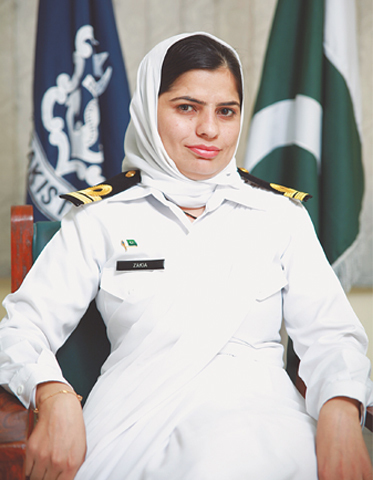Pioneering women: Defying stereotypes

At the time she joined the Pakistan Navy, Lieutenant Zakia Jamali had little idea of the direction her career would take. The only female commissioned naval officer from the province, the possibility of belonging to the navy’s elite seemed like a far-fetched idea for a young girl who grew up in Balochistan’s Jaffarabad district.
For Lt Jamali this is a childhood dream come true as she had always been fascinated with the armed forces. “I did my intermediate with science subjects only to join the military but I was rejected by the Pakistan Air Force for being short in height,” she recalls.
However, the naval officer, who had been brought up to face all challenges in life head on, didn’t give up her dreams and instead applied to the navy at a later stage. Lt Jamali attributes her strong headedness to her father, Niaz Mohammad Jamali, a pioneering educationist in the ’70s in her hometown.
Balochistan’s first female commissioned naval officer says she was able to achieve her dreams due to the support of Baloch society and her father
Lt Jamali’s father encouraged her and her four sisters to be well-educated — her other siblings now teach at government institutions, a career path Lt Jamali also initially opted for. After completing her Master’s in Urdu literature from Balochistan University, Quetta, she joined Usta Mohammad High School as an Urdu teacher. But her life took a different turn when Lt Jamali came across an advertisement about openings in the Pakistan Navy. “When the navy announced a vacancy for someone with a Master’s in Urdu, I applied immediately,” she says.
Lt Jamali says her journey to join the Naval Academy was nerve-racking; not because the selection process was tough but because her mother was suffering from cancer at that time, and it was hard to juggle all that was demanded of her.
The day she was called for her entrance test from the Inter-Services Selection Board, her mother went into a coma. When she regained consciousness after three days, Lt Jamali showed her the letter: “My mother was half conscious […] with a nod she gave me permission to pursue my desire”.
Lt Jamali states that women are held in such high esteem in the Baloch community that if a man being questioned in a jirga over a family dispute swears by his daughters, he is granted some form of respite or is even forgiven.
Sadly, Lt Jamali’s mother didn’t get to see her daughter fulfil her lifelong dream; the newly recruited cadet was just 20 days into her training at the Pakistan Naval Academy when her mother died.
“Both back at the village and here at the academy everyone believed that I won’t be able to continue my training, as it might take me some time to recover from the grave loss. But I returned to the academy and continued with my training. This earned me a lot of respect in the eyes of my seniors at the academy and the force, which I enjoy till today,” says the officer.
Lt Jamali was commissioned into the education branch of the Pakistan Navy as a sub-lieutenant in 2012 and has been teaching at the Cadet College in Ormara. Recently, she was promoted to the rank of lieutenant — a post she relishes. “During the final interview, the board had asked me whether I’d be comfortable working in Ormara or not. I told them I am a Baloch and Balochistan is my province, I will be more than happy to work there.”
Lt Jamali further points out that the rest of the country’s perception of girls’ education not being a top priority for the Baloch is completely wrong; in fact, it’s just the opposite. “In Naseerabad, Jhal magsi and other districts, educating girls is a preference and my sisters are an example of that,” she adds.
Baloch society, she says, respects women and values their opinion. “If a boy demands something, chances are that his family might turn him down. But if those demands are made by a girl, her family will do everything to fulfil them,” emphasises Lt Jamali. “This is the level of importance the Baloch give to their women.”
Lt Jamali states that women are held in such high esteem in the Baloch community that if a man being questioned in a jirga over a family dispute swears by his daughters, he is granted some form of respite or is even forgiven.
She feels that Baloch need to realise how important their province has become in recent years and how they can benefit from its geo-political importance. “The Baloch have a separate identity which must be respected but Pakistan is incomplete without Balochistan and vice versa.”
And Lt Jamali is still as passionate about literature as she was when she first decided to study it. Fond of Ghalib, Iqbal and Jaun Alia’s poetry, she says that she is drawn to “their innovation and the ability to preach new ideas through poetry”. While she likes Qurratulain Hyder’s work when it comes to Urdu prose, she also reads Baloch literature, and is inspired by the writings of Atta Shad and Danyal Tareen.
Well-read, vocal about her opinions and ambitious, Lt. Jamali clearly has a great career ahead of her. So what does she think about her achievements so far? “It was a unique honour that I was set to bring to my family and native town,” she says matter-of-factly.
Published in Dawn, Sunday Magazine, April 24th, 2016